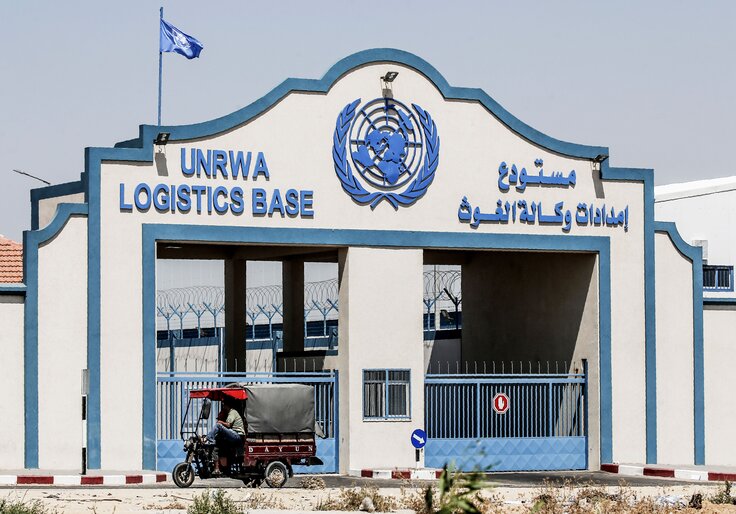Recent press reports have conveyed the false impression that the EU, the European Union of 27 nations, asked for budgetary sanctions against the PA if the PA will not change their curricula.
By implication, this affects UNRWA, which uses the PA curriculum as the exclusive source of text books used by UNRWA schools in Jerusalem, Judea, Samaria, and Gaza. UNRWA allocates 58% of its budget to education
While the European Parliament indeed asked for budgetary sanctions against the PA. because of Its curriculum, such a threat against the PA is absent from the following EU response to our query in this respect.
European Union Foreign Policy chief, Josep Borrell, vigorously protested the European Parliament proposed ban on financial aid to the Palestinian Authority because of content deemed “hateful and anti-Semitic” in Palestinian textbooks.
The confusion lies in the media characterization of the European Parliament as the EU Parliament, a designation which does not exist.
As an active member of the EU-Israel Press Forum, from 2003, the EU always mentions the huge difference between the European Parliament, which recommends EU policy initiatives, and the European Commission, which implements policy.
——————————————————————————————————————-
From: PISONERO HERNANDEZ Ana <Ana.PISONERO-HERNANDEZ@ec.europa.eu>
Date: Wed, May 17, 2023 at 4:41 PM
Subject: FW: Policy question from news and research agency: Does EU indeed threaten funding cuts if PA/UNRWA texts are not revised?
To: ctrforneareastpolicyresearch@gmail.com <ctrforneareastpolicyresearch@gmail.com>
Cc: STANO Peter <Peter.STANO@ec.europa.eu>, MULETIER Zoi <Zoi.MULETIER@ec.europa.eu>, FRANCHELLUCCI Gioia <Gioia.FRANCHELLUCCI@ext.ec.europa.eu>
Hi David,
You have sent your email to the Spokesperson’s service, dealing with media requests, we understand you are working for a think tank, but please find here our position. You may attribute to a Commission spokesperson.
The Commission notes the European Parliament discharge report deploring the problematic and hateful material in Palestinian school textbooks and study cards, including the budgetary authority’s repeated requests to ensure that all anti-Semitic references are deleted, and examples that incite hatred and violence are removed from textbooks and study cards, and that that financial support from the Union for the Palestinian Authority in the area of education shall be provided on the condition that textbook content is aligned with UNESCO standards.
The Commission has no tolerance for incitement to hatred and violence, and antisemitism in all its forms. These principles are non-negotiable for the Commission. Any material that goes against them risks undermining peace and coexistence and has no place in textbooks and classrooms. In this regard, the Commission reserves the right to take appropriate measures as necessary. We remain firmly committed to promoting inclusive and quality education for the Palestinian people, including to ensuring full adherence with the United Nations values and the United Nations Educational, Scientific and Cultural Organisation (Unesco) standards and norms in the field of education and in all education material. To this end, the Commission will continue its constructive engagement with the Palestinian Authority to support their curriculum reform and ensure they address any problematic issues in the Palestinian textbooks, including on the basis of the findings of the Georg Eckert Institute study, and a second study on the matter, to be financed by the Commission. We have a shared interest to ensure an education for the next generation that supports peace and co-existence.
The assessment carried out by Georg Eckert Institute for International Textbook Research provides an objective basis for the EU’s engagement with the Palestinian Authority on education reforms. Based on the study, the EU has stepped up its engagement with the Palestinian Authority to ensure that further curriculum reform addresses problematic issues identified in the shortest possible timeframe.
Kind regards
Ana
From: Center For Near East Policy Research Lt <ctrforneareastpolicyresearch@gmail.com>
Sent: Saturday, May 13, 2023 9:35 PM
To: STANO Peter (COMM) <Peter.STANO@ec.europa.eu>
Subject: Policy question from news and research agency : Does EU indeed threaten funding cuts if PA/UNRWA texts are not revised?
Subject: Policy question from news and research agency : Does EU indeed threaten funding cuts if PA/UNRWA texts are not revised?









